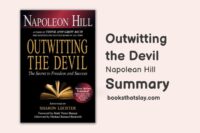The Second Mountain Summary And Key Lessons
“The Second Mountain: The Quest for a Moral Life” is a book by New York Times columnist David Brooks, published in 2019.
The book delves into the human journey towards finding meaning, purpose, and joy in our respective lives. Brooks explores the idea that life is composed of two main mountains that we climb, representing two primary pursuits, followed by the 4 commitments i.e. Vocation, Marriage and Family, Faith and Community.
The Second Mountain Summary
1. The Two Mountains
- The First Mountain: The initial phase of life is often about building the self, achieving personal success, and establishing oneself in the world. This can mean building a career, reputation, acquiring material wealth, and seeking individual happiness.
- The Second Mountain: After summiting the first mountain, many people feel a sense of emptiness or unfulfillment. They realize that self-centered ambition and individual success aren’t enough. The second mountain is about moving beyond the self and dedicating oneself to a higher calling or purpose, often involving selfless service to others.
2. The Valley
Before one begins the climb of the second mountain, there’s often a valley — a period of suffering, loss, or disillusionment.
This valley forces individuals to confront their lives, question their values, and can lead to profound personal transformation.
3. The Four Commitments
Brooks argues that climbing the second mountain often involves deepening our commitment to four central areas of life:
- Vocation: Finding a calling or purpose in one’s work that is larger than oneself. This isn’t just about a job; it’s about contributing to the world in a meaningful way.
- Marriage & Family: Building and nurturing deep, committed relationships with family, spouse, or life partner.
- Philosophy or Faith: Developing a coherent worldview or faith system that gives meaning and moral direction to life.
- Community: Investing in the well-being of one’s community, being an active part of a group, or serving a cause that benefits the collective.
4. Moral Renewal
Brooks emphasizes that society at large needs a kind of moral renewal. He critiques the hyper-individualistic culture prevalent in many Western societies, arguing that it leads to loneliness, polarization, and a lack of communal purpose.
Climbing the second mountain, in Brooks’ view, is both a personal and collective endeavor.
5. The Joy of the Second Mountain
The key message is that while the first mountain is about acquisition, the second mountain is about contribution.
And while the first brings moments of happiness, the second brings a deeper, lasting joy that comes from living a life of meaning, connection, and moral purpose.
Through personal anecdotes, stories of others, and philosophical reflection, Brooks makes a compelling case for reorienting our lives toward the values of the second mountain.
He suggests that in an age of increased alienation and division, this shift is not only personally enriching but also crucial for the health of society.

Also Read: A Gentleman in Moscow Summary, Review And Key Lessons
Key Lessons
1. The Pursuit of Individual Success Can Be Unfulfilling
Brooks emphasizes that while personal achievements and material success (the goals of the first mountain) are valuable, they often don’t lead to profound, lasting satisfaction.
Many people who achieve all their personal and career goals still feel a void or emptiness, suggesting that there’s more to a fulfilling life than personal success.
The best way to overcome it is to reassess your goals and values.
If you find yourself feeling unfulfilled despite achieving traditional markers of success, it might be time to reassess what truly matters. This reflection can pave the way to embark on the journey of the second mountain.
2. Personal Transformation Often Arises from Adversity:
The periods of suffering, doubt, or setbacks (referred to as the “valley” by Brooks) are not mere obstacles; they can be transformative.
These moments compel introspection, questioning of one’s path, and can lead to a deeper understanding of oneself and one’s purpose in the world.
So, instead of avoiding or resisting adversity, embracing it as a part of the journey can lead to a good amount of personal growth.
Challenges often provide the impetus to move from the first mountain to the second, pushing individuals to seek a deeper, more meaningful existence.
Also Read: The Measure Summary And Review
3. True Fulfillment Lies in Moving Beyond the Self:
Brooks emphasizes the profound joy and fulfillment that arise from dedicating oneself to something beyond personal ambition.
Whether it’s through a vocation that serves others, deepening personal relationships, contributing to a community, or pursuing a spiritual or philosophical path, these commitments anchor us and provide a sense of purpose.
While the first mountain is about what you can get, the second is about what you can give.
The act of giving, serving, and committing to causes beyond oneself leads to a deeper, more lasting sense of joy and contentment than individual achievements alone.
Final Thoughts
“The Second Mountain” is a thought-provoking exploration of personal fulfillment and the pursuit of a meaningful life. Brooks challenges readers to move beyond self-centered ambitions and to seek deeper connections, purpose, and joy in their lives.
Read our other summaries


